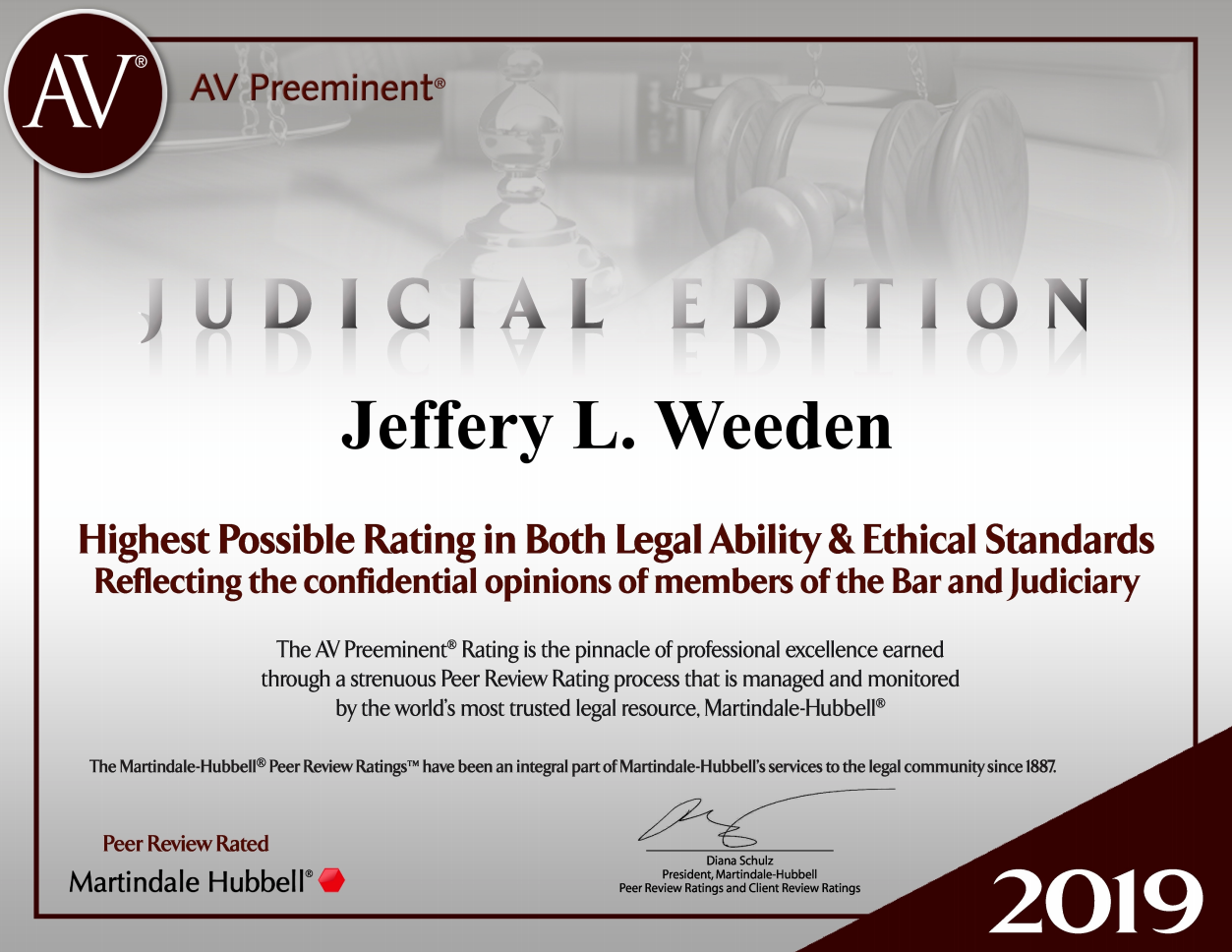Experienced Denver Criminal Defense Attorney for Stalking Charges

Stalking is a very serious criminal charge. A person does not need to know the intended victim intimately or directly, but often feels an unexplainable bond towards that person. Such behavior often advances to the point where the victim believes they are being pursued and the pursuer poses a credible threat.
If you’ve been accused or charged with stalking in Colorado, it is imperative that you take these criminal charges incredibly seriously. You need a criminal defense lawyer that will provide you the best chances of getting your charges reduced, dropped, dismissed, or avoiding a guilty verdict – should your case go to trial. Simply put, you need WeedenLaw. Attorney Jeff Weeden has the resources, skills, and knowledge to help you achieve the best possible outcome for your case. Call us today at (720) 307-4330 for a free initial consultation or reach out to us online for more information on how we can help.
What is Considered Stalking in Colorado?
Under Colorado law, the crime of stalking occurs when a person makes a credible threat against someone and repeatedly approaches, contacts, communicates with, or follows the victim or someone closely related to them.
Alternatively, Colorado considers it stalking when:
- A person repeatedly follows, approaches, contacts, places under surveillance, or communicates with someone or his/her immediate family or intimate partner;
- In a manner that would cause a reasonable person to suffer serious emotional distress; and
- The victim actually does suffer serious emotional distress.
Stalking Laws in Colorado
More specifically, Colorado Revised Statutes (C.R.S. § 18-3-602) provides the following:
“A person commits stalking if directly, or indirectly through another person, the person knowingly:
(a) Makes a credible threat to another person and, in connection with the threat, repeatedly follows, approaches, contacts, or places under surveillance that person, a member of that person’s immediate family, or someone with whom that person has or has had a continuing relationship; or
(b) Makes a credible threat to another person and, in connection with the threat, repeatedly makes any form of communication with that person, a member of that person’s immediate family, or someone with whom that person has or has had a continuing relationship, regardless of whether a conversation ensues; or
(c) Repeatedly follows, approaches, contacts, places under surveillance, or makes any form of communication with another person, a member of that person’s immediate family, or someone with whom that person has or has had a continuing relationship in a manner that would cause a reasonable person to suffer serious emotional distress and does cause that person, a member of that person’s immediate family, or someone with whom that person has or has had a continuing relationship to suffer serious emotional distress.
For purposes of this paragraph (c), a victim need not show that he or she received professional treatment or counseling to show that he or she suffered serious emotional distress.”
What is a Credible Threat?
Under the Colorado stalking statute, “credible threat” means, a threat, physical action, or repeated conduct that would cause a reasonable person to be in fear for their own safety, the safety of his or her immediate family member, or of someone with whom the person has or has had a continuing relationship. The threat need not be directly expressed if the totality of the conduct would cause a reasonable person such fear.
Credible threats can be made in-person or by:
- Phone calls
- Email or social media “cyber-stalking”
- Text message
- Written or typed letter
- Gestures
- Actions
- Any other means of communication
CRS § 18-3-602 applies no matter whether the alleged victim is an ordinary private citizen or a well-known celebrity. Stalking is illegal whether it occurs in private, public, a home, or the workplace.
Examples of Stalking
A couple of examples of stalking might include the following situations:
- A woman broke up with her boyfriend. He wasn’t ready to give up their relationship and instead of walking away, coerces the sister, gaining continued access to the ex-girlfriend. His constant presence puts an enormous strain and emotional distress on the entire family, especially the ex-girlfriend. This meets the elements of stalking.
- When a victim receives a bouquet from an abusive ex-boyfriend who she recently relocated to get away from, and she did not think he knew where her new home was, this flower delivery becomes terrifying and threatening.
- A young woman’s classmate is captivated by her and begins texting and calling her consistently. She asks him politely to stop and blocks his number, to which he reverts to following her around town and sitting outside of her apartment building for hours on end.
Types of Stalker
While most stalking cases look similar to outsiders and all involve similar types of stalking behavior, stalking can be categorized by the different types of people who engage in this crime. Understanding the various different types of stalkers helps professionals better understand this serious crime.
The Rejected Stalker
This type of stalker begins stalking behaviors after a close relationship breaks down. The rejected stalker’s victims are often former intimate partners, but family members and close friends who have ended or placed limitations on contact can also become victims.
The rejected stalker acts out of feelings of jealousy, over-independence, and humiliation. The rejected stalker is commonly the most intrusive and tenacious type of stalker and is most likely to use fear, intimidation, and violence.
The Resentful Stalker
This type of stalker is often paranoid and irrational in their beliefs that someone has wronged him or her. They commonly feel as if they have been unfairly dealt with, mistreated, or somehow abused by their victim, and have a strong desire to set things straight. They believe they are justified for their actions, which makes them obsessive and long-suffering in their stalking. They are most likely to verbally threaten their victim and least likely to engage in physical violence.
The Intimacy-Seeking Stalker
The intimacy-seeking stalker acts out of feelings of loneliness, as they lack close relationships. They are usually mentally ill, bearing a delusional belief that they have a close relationship with their victim, though no relationship exists. Their victims are commonly brief acquaintances or total strangers with whom the stalker desires to have an intimate relationship.
The Incompetent Suitor
The incompetent suitor is lonely and lusts after the attention of others. This stalker, however, is not looking for a long-term relationship but rather a date or a brief sexual relationship. The incompetent believes that anyone would be attracted to them and is blind to the fact that they are tormenting their victim. Behaviors of this stalker include repeated phone calls, repeatedly asking for a date, and attempting to hold their hand or kiss them.
The Predatory Stalker
This type of stalker engages in stalking behavior as a prelude to sexually attacking the victim. The predatory stalker rarely contacts or harasses his victim, preferring to follow and watch the victim, and often engages in voyeurism, exhibitionism, and fetishism. This type of stalker is highly likely to be physically violent.

Stalking vs. Harassment
While stalking and harassment are both criminal offenses, harassment is often not as serious as stalking. Though it is important to note that in both types of cases, the state must prove the existence of a course of conduct – a pattern of behavior that is exhibited over a period of time and is done with specific intent.
In order to prove harassment, the state must only prove that there was a course of conduct and that it was done for a purpose of annoying or harassing the victim. In order to prove stalking charges, the state must prove that there was a course of conduct and that it was done with the intent to place the victim in fear of serious injury, assault, or death. Though there are similarities between stalking and harassment, stalking involves a much greater and more serious element.
What are the Penalties for Stalking Charges in Colorado?
Stalking is considered an extraordinary risk crime under Colorado law. This means it is considered to pose a substantial risk of harm to society. As such, it will carry harsher penalties than other crimes that may fall in the same class. Extraordinary risk crimes are also ineligible for expungement or record sealing in Colorado, meaning it will remain on your criminal record forever. An experienced Denver stalking defense attorney can help you avoid the penalties that may come with a stalking conviction.
A person who has been convicted of stalking in Colorado will face a variety of severe legal consequences. These legal penalties include:
- First offense – A first-time stalking offense in Colorado is a Class 5 felony. The sentence is 1 to 4 years in prison (with mandatory 2-year parole) and/or a fine between $1,000 to $100,000.
- Second or subsequent offense – Within 7 years of a prior stalking conviction is considered a Class 4 felony. The penalty includes a prison sentence between 2 to 8 years (with mandatory 3-year parole) and/or a fine between $2,000 to $500,000.
- Stalking in violation of a protective order or a condition of probation or parole – Violating a restraining order or conditions of probation/parole by stalking, even if it is the defendant’s first offense, is a Class 4 felony punishable by 2 to 8 years in prison (with mandatory 3-year parole) and/or a fine of $2,000 to $500,000.

Call an Experienced Criminal Defense Lawyer in Denver, Colorado for Help With Your Stalking Charge
If you or someone you know has been charged with stalking, it is likely a frustrating and humiliating experience. More than that, a stalking case can lead to seriously harsh penalties for the accused, from years in prison to thousands upon thousands of dollars in fines (and more). That is why it is in your best interest that you obtain the help of a stalking attorney familiar with the Colorado legal system.
You can rest assured that when you obtain legal representation from WeedenLaw, our team of qualified attorneys will treat you with professionalism, courtesy, and confidentiality. We are prepared to walk you through all your legal options and provide the most aggressive defense approach in the entire Denver area. One meeting with Jeff Weeden and you’ll know you’ve found the right attorney with years of experience handling all types of criminal cases. Call our Denver law office today at 720-893-3831 to schedule your free consultation.

































